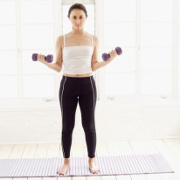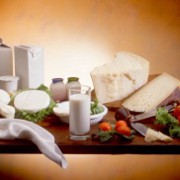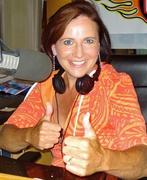 Photo: Getty Images
Photo: Getty Images
As I am moving faster through my forties than I ever thought I would, I do have some concerns over my continued bone health. Fortunately, I have always been in great health, inside and out, and I have never had any issues with my bones -- except for that one kick-boxing incident that we can just push to the side for now! I eat as healthy as I can and I try to exercise a minimum of two hours a day. I have done this since I was 11 years old, long before I realized the healthy habits I was putting into practice, and I believe they have served me well over the years.
At this stage in my life, I have yet to experience any tell-tale signs of menopause, and, quite frankly, I hope I can just skate right through it when the time does come. However, menopause is a fact of life for women, and, if we are not careful, we can compromise our bone health if we do not put theory into practice and begin to do those things that can assist with optimal bone health. Besides, if you are anything like me, you still plan to run those half-marathons when you are 90, right? It may take more time than it used to, but you still plan to be at the starting line and the finish line, hopefully in the same day, if not the same week, correct?
So, in honor of our glorious bodies and the impending transition, here are a few tips you can employ to give your bones an edge during the menopause transition period.
Did you know that peak bone mass is reached around age 29? From that point on, we begin to lose bone density. For many women, the time of menopause can greatly accelerate the loss of bone density. The medical community used to blame estrogen for this condition, but that is only a small factor. There truly is no one single cause that contributes to the breakdown of bones during menopause. Many factors come into play.
There is an upside, however! The increased velocity at which our bones lose their density tends to slow down within five to seven years after our last menstrual period. Therefore, it is important to look at the few years before and the few years after your last period. This is the time to really make it a point to be faithful to the following guidelines. (Of course, sticking to these guidelines is helpful at any age!) You’ve come this far….why not shoot out the backside of menopause in even better health? After all, you could live to be 100, so you want to be healthy for those remaining decades!
For starters, put good nutrition at the top of your list. Your body needs a balanced diet that consists of many vegetables, fruits, whole grains, seeds, and nuts. Be sure to incorporate lean protein, as well. We need to avoid foods that contain excess animal protein, refined grains, excess sugar, sodas, and preservatives. (Putting away the Diet Coke now!) It is important for women in the menopausal stage to focus on increasing their intake of Vitamin D and Vitamin K, as well.
Next on your list: Preserve and build that muscles mass! You don’t need to rock it on Muscle Beach, but it is important to maintain muscle strength. Therefore, exercising during the years leading up to and right after menopause is important. Unless you have made an on-going commitment early on in your life to maintain that muscle strength, one you hit age 30, you steadily begin to lose muscles mass. (Why does that seem so young to me? Must be the continued influence of my soon-to-be 106-year-old grandmother!) While I am not suggesting you run for miles on end each day, just doing some simple aerobics for 30 minutes a day, three days a week, can greatly contribute to your overall bone health.
Next stop: Balance those hormones! While I am not an expert on hormone replacement therapy (HRT), I have read conflicting reports on this, and being more of a natural person myself, I would prefer to go a more natural route. I am not one who likes to introduce synthetic substances into my body. Therefore, from what I have researched, eating a balanced diet full of fresh veggies and fruits, paired with quality protein and fats is a great diet to assume. In my humble opinion, eating good foods can never be a bad thing. (Now is NOT the time to admit I just ate a Tootsie Roll! Note to self: run two extra miles this afternoon!)
Another thought: Watch those pounds….not just how many extra you might have, but how you try to lose them! Actually, when you lose weight during the pre-menopausal period and menopausal period, it can adversely affect your bone health. This does not mean you can race to the couch and grab that remote in favor of preserving your bones. What it is suggesting is that you apply a smart approach to losing weight by combining healthy exercise with an alkaline diet. Try something different: take a yoga class or a Pilates class. Enroll in Qi Gong or T’ai Chi and finally understand that those are not some mystical recipes but actual exercise classes. Get your vitamin D levels tested and find out from your health care provider how you can supplement with vitamins D and K as needed.
This is just the tip of the iceberg, ladies. I tried to get some valuable input from that “over 100” grandma of mine, but when I brought up the words “hot flash,” she replied, “Hot flash? What’s a hot flash? I live in Houston, and it’s not even hot enough for me here!” I guess aliens just don’t go through menopause! They just get their second wind at age 100 and never look back!
(For more incredible information on this subject, go to http://www.womentowomen.com/bonehealth/bones-menopause.aspx. Dr. Susan Brown, PhD, offers some valuable insight, and, at this point, is more credible than my grandmother, who admits to eating salt right out of the shaker on a daily, if not hourly, basis, thereby refuting the evidence of a healthy diet!)






Add a CommentComments
There are no comments yet. Be the first one and get the conversation started!